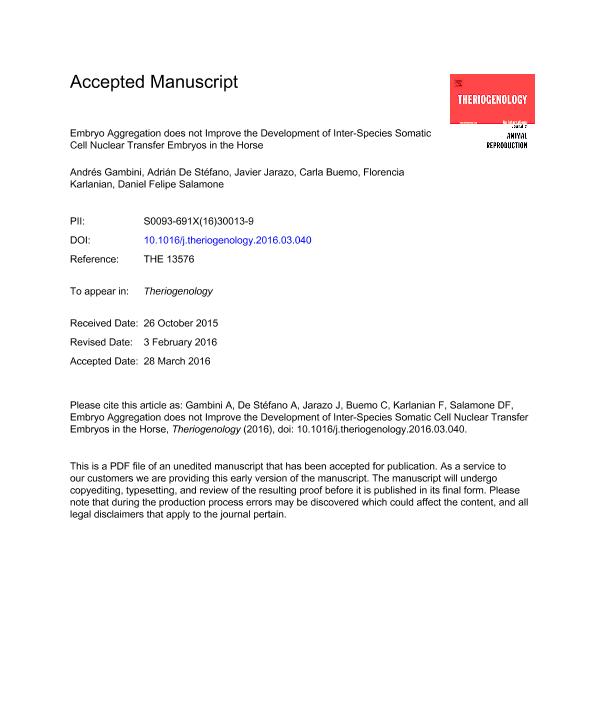Artículo
Embryo aggregation does not improve the development of interspecies somatic cell nuclear transfer embryos in the horse
Gambini, Andres ; de Stefano, Adrián; Jarazo, Javier; Buemo, Carla Paola
; de Stefano, Adrián; Jarazo, Javier; Buemo, Carla Paola ; Karlanian, Florencia; Salamone, Daniel Felipe
; Karlanian, Florencia; Salamone, Daniel Felipe
 ; de Stefano, Adrián; Jarazo, Javier; Buemo, Carla Paola
; de Stefano, Adrián; Jarazo, Javier; Buemo, Carla Paola ; Karlanian, Florencia; Salamone, Daniel Felipe
; Karlanian, Florencia; Salamone, Daniel Felipe
Fecha de publicación:
09/2016
Editorial:
Elsevier Science Inc
Revista:
Theriogenology
ISSN:
0093-691X
Idioma:
Inglés
Tipo de recurso:
Artículo publicado
Clasificación temática:
Resumen
The low efficiency of interspecies somatic cell nuclear transfer (iSCNT) makes it necessary to investigate new strategies to improve embryonic developmental competence. Embryo aggregation has been successfully applied to improve cloning efficiency in mammals, but it remains unclear whether it could also be beneficial for iSCNT. In this study, we first compared the effect of embryo aggregation over in vitro development and blastocyst quality of porcine, bovine, and feline zona-free (ZF) parthenogenetic (PA) embryos to test the effects of embryo aggregation on species that were later used as enucleated oocytes donors in our iSCNT study. We then assessed whether embryo aggregation could improve the in vitro development of ZF equine iSCNT embryos after reconstruction with porcine, bovine, and feline ooplasm. Bovine- and porcine-aggregated PA blastocysts had significantly larger diameters compared with nonaggregated embryos. On the other hand, feline- and bovine-aggregated PA embryos had higher blastocyst cell number. Embryo aggregation of equine-equine SCNT was found to be beneficial for embryo development as we have previously reported, but the aggregation of three ZF reconstructed embryos did not improve embryo developmental rates on iSCNT. In vitro embryo development of nonaggregated iSCNT was predominantly arrested around the stage when transcriptional activation of the embryonic genome is reported to start on the embryo of the donor species. Nevertheless, independent of embryo aggregation, equine blastocyst-like structures could be obtained in our study using domestic feline-enucleated oocytes. Taken together, these results reported that embryo aggregation enhance in vitro PA embryo development and embryo quality but effects vary depending on the species. Embryo aggregation also improves, as expected, the in vitro embryo development of equine-equine SCNT embryos; however, we did not observe positive effects on equine iSCNT embryo development. Among oocytes from domestic animals tested in our study, the feline ooplasm might be the most appropriate recipient to partially allow preimplantation embryo development of iSCNT equine embryos.
Palabras clave:
Aggregation
,
Embryo
,
Equine
,
Interspecies
,
Parthenogenetic
,
Scnt
Archivos asociados
Licencia
Identificadores
Colecciones
Articulos(INPA)
Articulos de UNIDAD EJECUTORA DE INVESTIGACIONES EN PRODUCCION ANIMAL
Articulos de UNIDAD EJECUTORA DE INVESTIGACIONES EN PRODUCCION ANIMAL
Citación
Gambini, Andres; de Stefano, Adrián; Jarazo, Javier; Buemo, Carla Paola; Karlanian, Florencia; et al.; Embryo aggregation does not improve the development of interspecies somatic cell nuclear transfer embryos in the horse; Elsevier Science Inc; Theriogenology; 86; 4; 9-2016; 1081-1091
Compartir
Altmétricas



